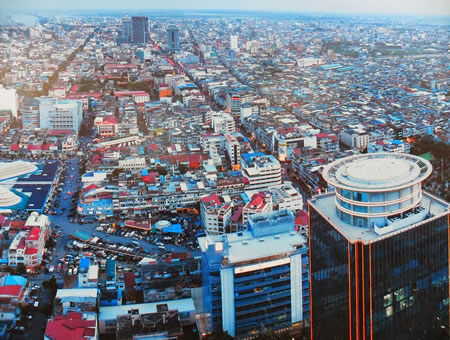 |
 |
||||
| Frequently Asked Questions about Buying a House in Cambodia Q1: Is Cambodia anti-Chinese? Is it friendly to Taiwanese? A: 1. Because China has provided a lot of assistance to Cambodia for a long time, Cambodia is very pro-China, friendly to China and not exclusive of China. 2. There are quite a lot of Taiwanese businessmen engaged in manufacturing in Cambodia, and Cambodians are also popular in learning Chinese. In addition to Cambodian, Chinese and English are commonly used in local sign shops. Q2: Does Cambodia allow foreigners to own legal real estate property rights? A: 1. It has been four years since Cambodia opened the door for foreigners to buy and sell real estate in 2010. 2. Foreigners can freely buy and sell apartments in the building under their own names only with their passports. Q3: Why invest in real estate in Phnom Penh? A: 1. Strong growth: Cambodia's economic growth rate is 7%, and Taiwan's is 2%. Do you want to invest in a company that makes $7 or a company that makes $2? 2. The base period of housing prices is low and the growth rate is large: Phnom Penh is the capital, and the current housing prices are just about to rise (similar to Taiwan's real estate in the 1980s when it just started to rise, and the increase is calculated in multiples). 3. High rental income: the annual rental return rate is about 10% 4. High interest income: The deposit interest in Phnom Penh is at least 4-5%, much higher than Taiwan's 1%. 5. The economic outlook is bright: [Next year ASEAN launch: zero tariffs] + [low base period] + [40% of the population is under the age of 14: demographic dividend] + [the world's cheapest labor force] + [political stability] + [economic openness] Q4: What taxes and fees will there be in housing sales? A: 1. The concept and ability of the Cambodian government's taxation is still in its infancy. There is no luxury tax, inheritance tax, etc., only 4% transaction tax (or "name change fee") and an administrative fee of about 1,000 US dollars. Because the buyer is responsible for the 4% transaction tax and administrative fees for renaming, so you must think about whose name will be registered when you hand over the house. Q5: What is the difference between land and house titles and Taiwan? A: 1. Cambodia is different from Taiwan. There is a choice between land and housing titles; if there is a land title, there is no real estate certificate, and if there is a real estate certificate, there is no land title. 2. For example: if a house is built on a piece of land, the government will only give a certificate of title to the land; Another example: a collective housing is built on a piece of land, the government will issue the construction permit first, and then issue it after the construction is completed. Individual real estate certificates (the original land title certificates are recovered by the Ministry of Land and Resources). 3. The real estate certificate is the complete property right. The rights of foreigners are exactly the same as those of domestic people, and they can also take loans in banks. The right to remodel in the future will also be distributed according to the proportion of the owner's real estate certificate. Q6: Is the sales site freehold? What is the difference with the 99-year lease? A: 1. Permanent property rights: The buyer has a real estate certificate issued by the Ministry of Land and Resources of the government (similar to the certificate of title in Taiwan), which is permanently owned and guaranteed by the government. 2. In a 99-year lease, the developer and the government lease the land for development and sales (similar to BOT). What the buyer gets is the certificate of title from the developer instead of the real estate certificate. 3. The risk of a 99-year lease: The developer may sell more than one house. In case the developer collapses, the buyer has no guarantee. |
Frequently Asked Questions about Buying a House in Cambodia
|
||||
 |
 |
||||
 |
 |
||||
 |
|
||||
|
|||||



 .......热点省份代理人 詹经理 Rock Chan
.......热点省份代理人 詹经理 Rock Chan